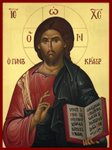
In a previous blog (found here), I gave a brief overview of the four senses of Scripture. My intent is to encourage people to read and study the Scriptures by utilizing the four senses so that they may hear God speaking to them and, of course, to deepen our knowledge of Revelation.
Today, I want to examine the literal sense in more detail. The Catechism defines the literal sense thusly:
116 The literal sense is the meaning conveyed by the words of Scripture and discovered by exegesis, following the rules of sound interpretation: "All other senses of Sacred Scripture are based on the literal."
St. Thomas defines the literal sense as
[the] first signification whereby words signifies things belongs to the first sense, the historical or literal. (STh I q1. a10 )
Let me explain. St. Thomas makes the division between the literal and spiritual senses by what exactly is signifying something else. The literal sense is that where the words signify things. This is common usage. When we speak or write, we use words to signify some thing. The spiritual sense, however, is that where things signify other things. St. Thomas states that God, since he is the author of Holy Scripture, can signify what he means not only with words (as we do) but also with the things themselves; indicating the literal and spiritual senses, respectively.
The Catechism makes this clear when it says that the "literal sense is the meaning conveyed by the words of Scripture". This is where exegesis and commentaries come in. It is clear that the sacred writers didn't write in English or with a 21st mind-set. In addition, this is God's word expressed in human words by authentic human authors. Therefore, we must discover the true intention of the sacred author in order to discover the intention of the Holy Spirit.
To search out the intention of the sacred writers, attention should be given, among other things, to "literary forms." For truth is set forth and expressed differently in texts which are variously historical, prophetic, poetic, or of other forms of discourse. The interpreter must investigate what meaning the sacred writer intended to express and actually expressed in particular circumstances by using contemporary literary forms in accordance with the situation of his own time and culture. For the correct understanding of what the sacred author wanted to assert, due attention must be paid to the customary and characteristic styles of feeling, speaking and narrating which prevailed at the time of the sacred writer, and to the patterns men normally employed at that period in their everyday dealings with one another. (Dei Verbum #12)
The best explanation I've heard is that of a "knock, knock joke". If you were sitting with a friend and they turned to you and said, "Knock, knock". You would naturally reply, "Who's there?" If on the other hand your friend says "Knock" waits for two minutes and says "Knock" again, you wouldn't know what they are trying to do. The reason is that you know the convention of starting a 'knock, knock-joke'. When someone uses those particular words in a particular manner you already know the "form" of the joke and can respond accordingly with the expectation that you will be hearing a joke once you have said "Who's there?" We must learn through historical research what these conventions were that the sacred writers used so we can understand what they are trying to communicate whether that be history, a parable, a proverb, etc. Pope Benedict XVI in the Foreword to his book Jesus of Nazareth states that the Historical-Critical method is "an indispensable dimensions of exegetical work. For it is the very essence of biblical faith to be about real historical events." However, this does not mean that only those with degrees in Scripture scholarship should read the Bible, or that biblical exegesis is exhausted by the Historical-Critical Method (as is plainly stated by Pope Benedict XVI in the same Foreword to Jesus of Nazareth). We must, however, rely on experts to help us. There is a lot of good work out there and a bunch of bad. One criteria I use is to "ask" the commentary I am using its opinion of miracles. If the author(s) rejects miracles or tries to explain them away, then I know to take it with a grain of salt. Another even better criteria is to ascertain the position of the author(s) towards the Magisterium. If the Church's authority is rejected, then the commentary must be used very carefully. Protestant or Jewish commentaries can be valuable if one realizes their limitations.
Now, we must become students of the Scripture not simply relying on others to tell us what the sacred text means. We must study so as to come to the meaning of the Scriptures ourselves. Now I am not suggesting that we do  this unaided. We need the work of experts to supplement our own study, but their work should not substitute for our own! This book, The New Joy of Discovery in Bible Study will be a huge help. It is not a commentary. It is a book that teaches one how to analyze a text and discover what the author is intending. We typically read things so fast that we over-read much of the details and keys that help us understand the Biblical text. This book gives the tools to do such an analysis. Next, one must immerse themselves in the Scriptures reading them and praying them everyday. A key to understanding the Scriptures is to have a intimate relationship with the Triune God (conversely, reading and praying the Scriptures helps bring about this intimacy). The then Cardinal Ratzinger gives us great insight into that fact in his book Behold the Pierced One:
this unaided. We need the work of experts to supplement our own study, but their work should not substitute for our own! This book, The New Joy of Discovery in Bible Study will be a huge help. It is not a commentary. It is a book that teaches one how to analyze a text and discover what the author is intending. We typically read things so fast that we over-read much of the details and keys that help us understand the Biblical text. This book gives the tools to do such an analysis. Next, one must immerse themselves in the Scriptures reading them and praying them everyday. A key to understanding the Scriptures is to have a intimate relationship with the Triune God (conversely, reading and praying the Scriptures helps bring about this intimacy). The then Cardinal Ratzinger gives us great insight into that fact in his book Behold the Pierced One:
Only by entering into Jesus' solitude, only by participating in what is most personal in him, his communication with the Father, can one see what this most personal reality is; only thus can one penetrate to his identity. This is the only way to understand him and to grasp what "following Jesus" means. The Christian confession is not a neutral proposition; it is prayer, only yielding its meaning within prayer. (pg. 19)
Jesus prayed in the words of Scripture an that Scripture became flesh in him, became the actual Passion of this Righteous One; and that he thus inserted his death into the word of God, in which he lived and which lived in him declaring itself in him. (p. 24)
Since the center of the person of Jesus is prayer, it is essential to participate in his prayer if we are to know and understand him. (p. 25)
To know him we must be in a certain way like him. To know the Scriptures requires knowing him since Christ the Word is the principle, subject, and author of Scripture.
OK, back to the literal sense. St. Thomas identifies four divisions of the literal sense: historical, etiological, the analogy of faith, and metaphorical (or parabolic). (STh I q1.a10.ad2) It is called historical when anything is simply related. This would be the case in much of the Gospels as they are simply relating what happened. That does not mean, however, that the Gospels are a simple reporting of a historical timeline. The Catechism tells us that the Gospel writers
126§3 ...in writing the four Gospels, selected certain of the many elements which had been handed on, either orally or already in written form; others they synthesized or explained with an eye to the situation of the churches, the while sustaining the form of preaching, but always in such a fashion that they have told us the honest truth about Jesus.
The key here being that "they have told us the honest truth about Jesus". It is etiological when the cause is assigned, "as when Our Lord gave the reason why Moses allowed the putting away of wives - namely, because of the hardness of men's hearts (cf. Mt 19:8)" (STh I q1.a10.ad2). It is the analogy of faith when the truth of one text is shown not to contradict the truth of another (cf. CCC #114). Finally, the metaphorical (or parabolical sense)
is contained in the literal, for by the words things are signified properly and figuratively. Nor is the figure itself, but that which is figured, the literal sense. When Scripture speaks of God's arm, the literal sense is not that God has such a member, but only what is signified by this power, namely, operative power. Hence is is plain that nothing false can ever underlie the literal sense of Holy Scripture. (St. Thomas STh I q1.a10.ad3)
Analyzing and determining the literal sense of a Scripture is arduous work. It takes time to wrestle with the text, read the commentaries, look at word meanings, and pray. It is the work of love, and it does bear abundant fruit. I would suggest beginning in the New Testament in one of the Gospels. Oh, one last resource. I have found the Synopsis of the Four Gospels edited by Kurt Aland a tremendous help. He lines up the four Gospels according to subject side by side so one can compare the Gospels easily to one another.
A commenter pointed out that Mark Shea wrote a book concerning the four senses (follow the link. You'll have to scroll down a bit to find it). It is called Making Senses Out of Scripture: Reading the Bible as the First Christians Did. I have not read it, but I am sure it is excellent.
Next time, we'll take a look at the Spiritual senses of Scripture.



No comments:
Post a Comment